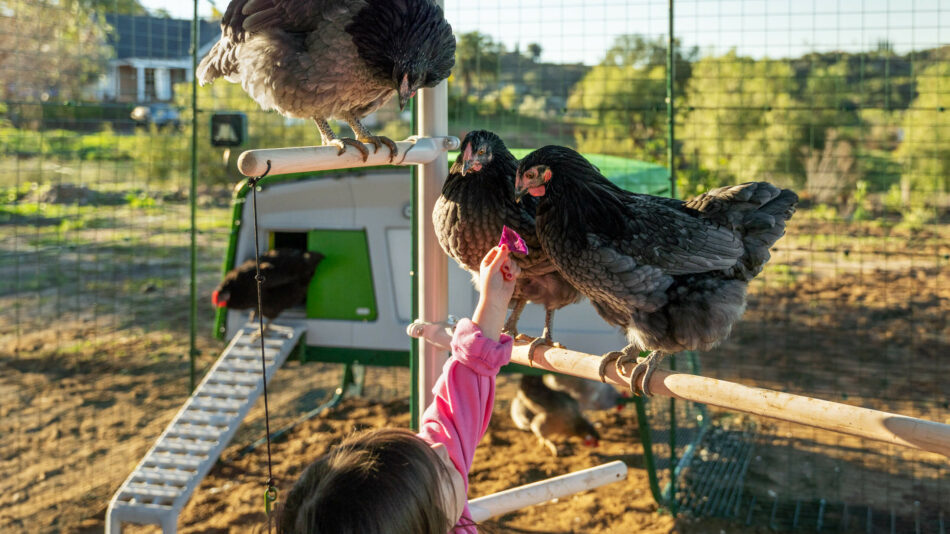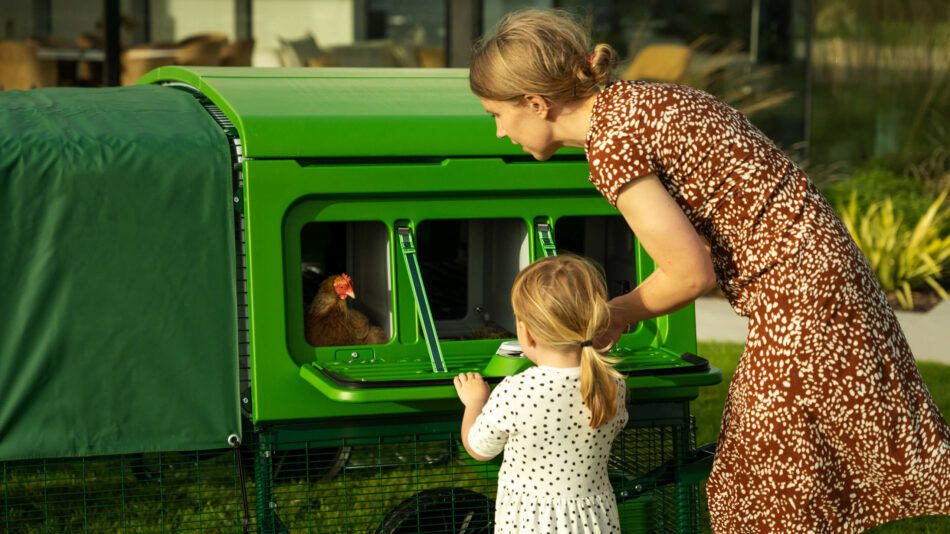Chicken keeping in the summer
Chicken keeping in the summer requires flock-raisers to make some seasonal changes. For most regions, chickens are at a higher risk of overheating in the summer than freezing in the winter. Here are some chicken keeping considerations that are specific to summer, along with how to spot a flock that’s getting too hot, and how to help your hens through this warmer season.
Recognize signs of heat stress in hens
The most important skill to learn when keeping chickens in the summer is the ability to recognize the signs of heat stress in your hens. Heat stress can happen quickly, or over time, and can rapidly turn into heatstroke in chickens if not promptly treated.
Heat stress occurs when your chickens are unable to regulate their body temperature. This most often occurs when the ambient temperature and humidity level causes the “real feel” temperature higher than your chickens’ normal core temperature of 40.5°C-41.5°C. This “real feel” temperature is known as the heat index, and can be calculated through online tools by determining a ratio of the temperature and relative humidity. For example, a temperature of 32°C and a humidity level of 80% creates a heat index of 48°C. Understanding the heat index versus the actual temperature will help you determine when your hens may be too hot.
The symptoms of heat stress in chickens include:
- Panting
- Holding wings away from their body
- Decreased appetite
- Lethargy
- Decreased egg production
Heatstroke occurs when a chicken’s body temperature remains elevated for an extended period of time, which causes organ failure. Signs that a chicken has progressed into heatstroke include those of heat stress, plus:
- Pale combs and wattles
- Collapse
If you notice your hens experiencing heat stress, move them to a cooler environment. Cool them down by submerging them from the neck down in a bucket of tepid water, or by bringing them into a more climate controlled environment. Don’t attempt to cool them down with ice packs or other extreme cooling measures, as this can bring their body temperature down too quickly and induce shock. If you don’t notice an improvement within 10-15 minutes, or you suspect that your chicken has already progressed into heatstroke, call your veterinarian.
Keeping your chickens cool during the summer
Avoiding heat stress is the best way to keep your flock healthy and happy during the warmer months. There are several ways to keep your hens cool during the summer. For maximum effect, use a combination of the following cooling methods.
Shade
Shade is one of the most important elements when keeping your flock safe in the heat. In dry climates in particular, shaded areas can be 10 or more degrees cooler than the temperature in the sun. A large, elevated chicken coop offers shade beneath the coop, and chicken run covers keep harmful UV rays off of your hens. If your flock free-ranges, make sure they have access to bushes, trees, or other sources of shade.
Cool water
Water is critical for chickens to keep cool in the heat. Your flock will need constant access to fresh, cool water to drink, and shallow pans or containers that they can stand in will help lower their body temperatures. Frozen water bottles or ice can be added to chicken waterers to keep the temperature palatable. Your flock will drink more during the warmer weather, so be sure to check their water levels and refill as often as needed. Electrolytes can also be added to their water to replenish nutrients and energy lost to the heat.
Misters or sprinklers
Other water elements that your hot-flock will appreciate are misters or sprinklers. Patio misting systems or sprinklers that provide a fine spray can significantly lower the temperature of surrounding areas. Add a large fan to circulate even more air, and your flock will have their own outdoor air conditioning system.
Dust baths
Chickens dust bathe more frequently in the hotter months to keep their skin and feathers in good condition. The dust helps keep parasites at bay, and helps separate individual feathers to allow more air circulation on their bodies. Make a chicken dust bath to help your hens in their endeavours, or give them access to dusty or sandy areas of your property for them to create their own bathing areas.
Cool treats
Summer chicken treats are an excellent way to boost your flock’s nutrition while providing relief from the heat. Frozen fruits and vegetables will help keep your hens cool, and chilled melon or lettuce contain water to help them stay hydrated. You can freeze scratch grains in ice trays or an ice mold for your hens to peck at, or freeze watermelon pieces to make their treating experience last longer.
Smart automatic chicken coop door
A smart automatic chicken coop door helps keep your hens on their schedule no matter the season. With settings that enable the door to open and close according to the sun or your own schedule, the Smart Autodoor by Omlet also allows you to open and close the coop door from the comfort of your own home. And, with connectivity all over the world, you can control your chicken coop door from wherever your summer travels take you.
Omlet and your flock
Supporting your flock throughout the summer doesn’t have to be a chore. With the right chicken-keeping essentials, you’ll be able to sit back and enjoy the summer, and every season, with your hens. From extra large chicken coops to smart automatic chicken coop doors and covered outdoor chicken runs, our expertly designed chicken products make chicken keeping in the summer easier than ever.
This entry was posted in Chickens



2 replies on “Chicken keeping in the summer”
Very interesting Im going to put a watering can full of water over my two eglu s when its hot a good tip Thank you
Hi I am new to chicken keeping. Our lovely six birds, we think were taken by a badger, as it was seen on camera, but we have seen foxes in the garden too!!!
I am interested in your framed totally enclosed run can you please supply sizes and costs for me to consider? Thank you